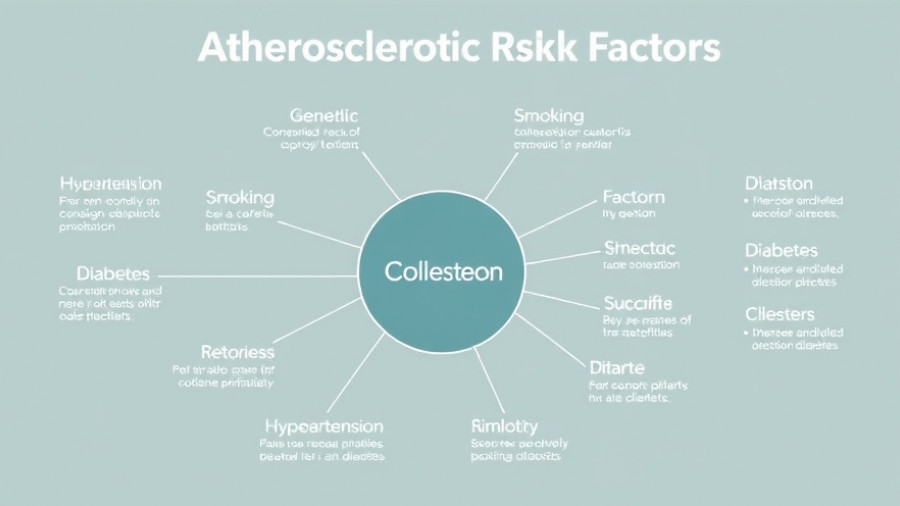
Understanding Cholesterol Levels: More Than Just Numbers
When most of us hear that our cholesterol levels are "normal," it might sound like good news. However, it's crucial to recognize that merely being within the so-called normal range might not equate to being in the best shape for our bodies. In a world where cardiovascular diseases (CVDs) are the leading cause of death, the implication of just settling for normal levels of low-density lipoprotein (LDL) cholesterol can be misleading.
What Does 'Normal' Mean Anyway?
According to research, there's a significant difference between having a normal cholesterol level and an optimal level. Normal cholesterol levels — as set by current medical guidelines — may fall between 100 and 129 mg/dL for LDL cholesterol. However, this target doesn't represent true health safety.
Expert consensus indicates that a healthier target exists: LDL cholesterol levels should be below 70 mg/dL for optimal health. In fact, below 50 mg/dL is ideal. Alas, many people receiving a "normal" label don’t realize their levels could be hiding serious health risks. This is because a large percentage of individuals with “acceptable” cholesterol levels still have atherosclerotic plaques in their arteries — a dangerous form of buildup.
The Misleading Nature of Cholesterol Assessments
Statistics reveal a disconcerting reality. When scrutinized through advanced imaging techniques like ultrasounds and CT scans, nearly 38% of individuals with standard LDL cholesterol levels maintain hidden plaques. These plaques can dangerously rupture and lead to heart attacks or strokes.
So what causes this deceptive phenomenon? Observational evidence presents that many individuals might possess "normal" readings yet still exhibit traits typically associated with high cholesterol, primarily due to their diets and sedentary lifestyles.
Why Lowering LDL Cholesterol Matters
Research emphasizes the idea that "lower is better" when it comes to LDL cholesterol. Not only can low levels reduce the occurrence of heart attacks and strokes, but they can also help break down existing arterial plaques. Studies show that when individuals shrink their LDL levels around or below 55 mg/dL, the risk of cardiovascular events significantly decreases.
Practically speaking, achieving these lower levels may involve several lifestyle alterations — primarily dietary changes. Embracing diets centered around whole plant foods, much like the traditional diets of hunter-gatherers, assists in reducing LDLs sustainably.
Myths and Misconceptions About Cholesterol
A common misconception is that all cholesterol is harmful. While LDL cholesterol is often referred to as “bad,” it’s important to understand that cholesterol plays vital roles in bodily functions, including hormone production and cell membrane integrity.
Another myth is that low-fat diets alone are sufficient for cholesterol management. In many cases, not all fats are created equal. Instead of focusing solely on fat reduction, a balanced approach that reduces saturated fats, increases fiber, and promotes physical activity yields better results.
Actionable Insights: Steps Towards Healthy Cholesterol Levels
1. **Dietary Modifications**: Prioritize a whole-food diet, focusing on fruits, vegetables, whole grains, and healthy fats. Cut down on processed foods, trans fats, and excessive saturated fats.
2. **Regular Exercise**: Aim for at least 150 minutes of moderate aerobic activity weekly.
3. **Regular Check-ups**: Schedule regular cholesterol screenings. Discuss with your doctor what levels are optimal for you based on personal risk factors.
The Path Forward: Embrace Optimal Health
You hold the power to change your cholesterol trajectory. Don't settle for normal; aim for what the body naturally thrives on. Connect with family and friends to explore healthy cooking and exercise together. You’ll find joy in teamwork and camaraderie, pushing each other towards healthier lives.
Call to Action: Don’t wait until your next doctor’s visit. Start taking proactive steps today to understand your cholesterol levels better. Consult with your healthcare provider about targeted strategies to lower your LDL cholesterol and improve your heart health!
 Add Row
Add Row  Add
Add 




Write A Comment